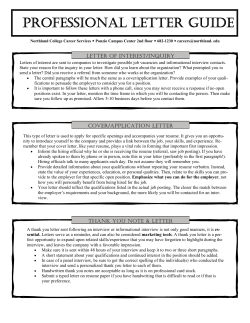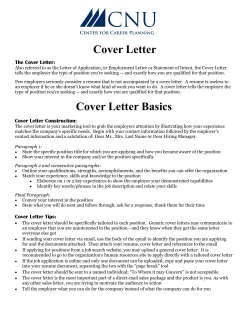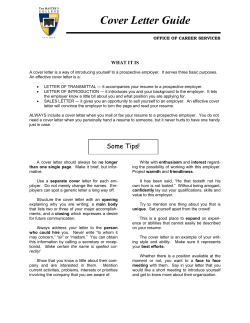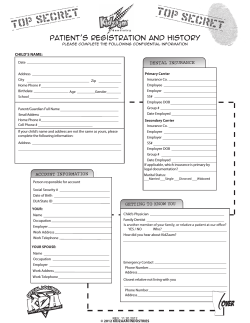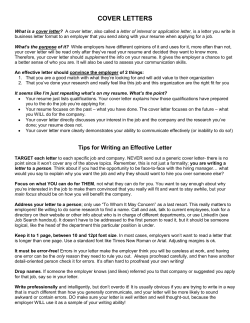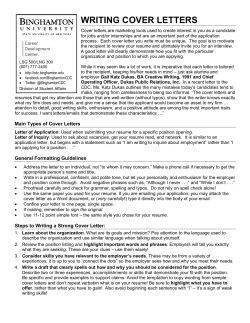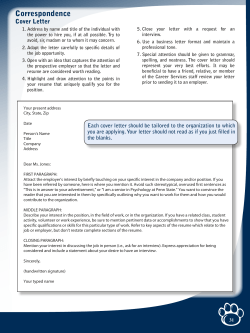
3 Letters How to Write a Great Letter
Cover Letters 3 How to Write a Great Letter You will have many different forms of correspondence with employers throughout your job search— informational interview letters, cover letters, thank you notes, acceptance offers, and decline letters. These forms of communication are a crucial part of your resume “marketing” package. They communicate a great deal about your skills, abilities, and personality. Make sure you are as careful with these letters as you are with your resume. Adhering to the universal format, style, and etiquette of standard business writing eliminates the risk of alienating potential employers. Employers also appreciate the ability to communicate professionally. Before you sit down to write your cover letter, take a closer look at the employer and try to determine his/her requirements and needs. Next, plan your letter by placing the most important items first, supported by facts and examples. It is crucial to write a letter that demonstrates how your background, education, work experiences, and abilities can meet the needs of the employer. This approach will help you persuade the reader that you are a good match for the position and that they should interview you. Remember, your goal is to show your value to the employer. Keep the following key points in mind when writing each letter: ■ ■ Show your interest. Whenever possible, research each employer’s organization and then personalize the letter. When you indicate that you know something about the organization, it shows that you are seriously interested in the employer. This approach is much more effective than sending out hundreds of identical form letters. Highlight one or two of your most significant accomplishments or abilities. This draws immediate attention to your most impressive skills. It also demonstrates that you are an above average candidate, which increases your chances of being remembered. ■ Be brief. This shows you understand the value of the reader’s time. ■ Be persuasive. Don’t just describe your background—your resume takes care of that. Be clear about your objectives and make the employer want to take a closer look at your resume. ■ Use a positive tone. The letter should be written in a very clear and positive manner. Do not add details about yourself, your past experiences, or your education that may call attention to your weaknesses or raise questions about your confidence or ability to do the job. ■ Use powerful action verbs. By using the active voice, you will grab the reader’s interest and convey a sense of energy. S E R I O U S N e t W O R K I N G TM 3 ■ Organize your information for the reader. Group similar items together in paragraphs and then organize the paragraphs so they relate to each other logically. Avoid writing that lumps together unrelated information without a strong topic sentence. ■ Avoid jargon and cliches. It is tempting to use ready made phrases such as “self-starter,” “proven leadership skills,” “excellent interpersonal skills,” but using today’s buzzwords can suggest parroted formulas rather than original thought. Informational interview request letters Conducting informational interviews is an excellent way to research companies and find out more about career fields and potential job leads. When you write a letter requesting an informational interview, make it clear that your purpose is to get information and advice—not to get a job. In the letter, introduce yourself and why you are writing. Indicate that you will follow up with a phone call to arrange a meeting time or a telephone interview at a time that is convenient to the employer. Do not enclose a resume—you are not asking for a job. If the contact was suggested to you by someone, make sure you include this information. If you did get the contact from an acquaintance, ask him/her for advice and comments on the best approach for asking for the interview. When writing a letter requesting an information interview, do the following: ■ ■ ■ ■ ■ Introduce yourself and your purpose for writing. Briefly describe your background and why you are interested in the contact’s industry, career field, or organization. Let the contact know up front how they can help you. Set a time frame of when you intend to follow up by telephone. Be brief and professional. Cover Letters Never send a resume without a cover letter unless the employer specifically states “no cover letter.” The purpose of your cover letter is to introduce your resume and highlight aspects of your experience and skills that are most relevant to the position you are seeking. Your cover letter will be much more effective if written for a particular employer and position. Researching each employer and position allows you to personalize the letter and draw direct connections between your qualifications and the job requirements. Your letter should provide the employer with the following information: ■ ■ ■ ■ Why are you writing? Why are you interested in the organization and/or job? Why would the employer be interested in you? What is your next step? Provide the reader with the answers to these questions in three main sections: S E R I O U S N e t W O R K I N G TM Introduction 3 Introduce yourself and why you are writing to the employer. Answer the reader’s question: “Why am I reading this letter?” Name the position or field you are interested in, how you learned of the opening or organization, and, if appropriate, who referred you. In a sentence or two, explain what skills make you the best candidate for the position. Body In one or two succinct paragraphs, match your background to the experience and skill requirements of the job position. It is best to summarize your qualifications and give specific examples. You shouldn’t repeat what is stated in your resume. Instead, expand on your experience that relates to the job and the employer. Also, identify any transferable skills, strengths, accomplishments, and results. Closing This paragraph should be brief. Simply summarize the letter, and indicate that you have enclosed your resume. Make sure you state what the next step is. End the letter with an active statement, such as an offer to contact the employer within a specific period of time, usually one to two weeks. Always confirm how they may reach you, either by phone or email. Close the letter by thanking the reader for their time and consideration. Don’t forget to sign your letter. Thank You Letters You should send a thank you letter immediately after every job interview or informational interview (whether by phone or in person). This is an opportunity to express appreciation and confirm your interest in the position and the organization. You can also, if necessary, clarify any answers you gave in the interview. They should be sent to everyone that helps you in any way. If you are sending a thank you letter after an employment interview, mail it within 24 hours. Tips on Writing Thank You Letters ■ ■ ■ ■ ■ ■ If you were interviewed by more than one person, send a thank you letter to the key hiring decision maker and to the person who coordinated the interview process. Personalize each letter, since the recipients are likely to discuss your candidacy together. In your letter to the coordinator of the interview, mention the names of those you met. Use plain, light-colored stationery. Although this is still a business letter, it may be more personal in tone. Mention the date you spoke with the person, and highlight a particularly useful piece of information you received or gave them. Keep your letter brief. Three short paragraphs are usually sufficient. Acceptance and decline letters At some point in your job search, you will have to accept and/or decline job offers. First, respond to the offer by telephone, then follow S E R I O U S N e t W O R K I N G TM up with a letter. By confirming your decision in writing, you prevent any future confusion and misunderstandings. 3 When writing an offer acceptance letter, include details of the position including salary, other bonuses, job title, start date and location, and relocation package if one is offered. Don’t forget to include a short message about your enthusiasm for the position and appreciation for the opportunity. When writing a letter declining an offer, include a statement of appreciation for the offer, a brief reason for declining the offer, and a statement that leaves open the possibility of some future contact, if desired. S E R I O U S N e t W O R K I N G TM The Cover Letter Checklist 3 Writing Style ■ Keep your average sentence ten to twenty words. Shorten any sentence of more than twenty words or break it into two sentences. ■ Keep every paragraph under five lines, with most paragraphs shorter. ■ Make sure your sentences begin with or contain, wherever possible, powerful action verbs. The Basics ■ Address the letter to a person whenever possible, preferably a person who is in a position to make a hiring decision. Check for spelling of the person’s name and the exact title. ■ Tailor the letter to the reader to show that you are interested in and have researched the organization. ■ Use your own words. Your letter should highlight your own individual strengths and skills. It is a good idea to look at sample letters as examples of how letters might be written, but don’t copy language from sample letters. ■ Demonstrate energy and enthusiasm. ■ Emphasize what you offer the employer, and supplement and support your resume. ■ Give concrete examples of your abilities and skills. ■ Be concise. Use direct, positive language. Avoid flowery or overly formal wording. ■ Keep a balance between professionalism and friendliness. ■ Include information relevant to the job you are seeking. ■ Clearly ask for the next step in the process without either apology or arrogance. Contact Information ■ Your pertinent personal data (name, address, zip code, and personal telephone number) should be on every page. ■ Omit your business number unless it is absolutely necessary and safe to include it. ■ If your letter is more than one page long, each page should be numbered and all the pages should be bound together, either by staple or paper clip, so that they will not get separated. Objectives ■ Does your letter state why you are writing—to apply for a job, follow up on an interview, etc.? ■ Is the letter tied specifically to the target organization and job (if you have details)? ■ Does it address points of relevance, such as applicable skills from the job description or issues discussed at the interview? ■ Does it include references to some of your personality or behavioral traits that are crucial to success in your field? S E R I O U S N e t W O R K I N G TM 3 ■ Is your most relevant and qualifying experience prioritized to lend strength to your letter? ■ Have you avoided wasting more space than required with employer names and addresses? ■ Have you omitted any reference to reasons for leaving a particular job? Reasons for change might be important to the employer at the interview, but they are not relevant at this point. Use this precious space to sell, not to justify. ■ Unless they have been specifically requested, have you removed all references to past, current, or desired salaries? ■ If your education is mentioned, is it relevant to the job listing? Is your highest educational attainment the one you mention? ■ Have you avoided listing irrelevant responsibilities or job titles? ■ Have you mentioned your contributions, your achievements, and the problems you have successfully solved during your career? ■ Have you avoided vagueness by eliminating all extraneous information? ■ Is the whole thing long enough to whet the reader’s appetite for more details, yet short enough not to satisfy that hunger? ■ Have you left out lists of references and only mentioned the availability of references (if, of course, there is nothing more valuable to fill up the space)? To employers this is a given. If you aren’t prepared to produce them on demand, you simply won’t get the job. Correspondence Tips ■ ■ ■ ■ ■ ■ ■ Use standard business style format and 8 1/2” x 11” paper. Type all letters. Employers type even personal notes, so follow suit. Never photocopy a letter—each must be an original. Make paragraphs approximately the same length. Always send a letter with a resume, never a resume alone. Check your work carefully for grammar and spelling. It is a good idea to have someone else proofread it. Be wary of suggestions to use gimmicks, or desperate-sounding phrases, and exaggerated praise of the employer. S E R I O U S N e t W O R K I N G TM Common Cover Letter Mistakes 3 Cover letters are a great way to get an employer interested in your resume and you. There are certain commonly made mistakes that will diminish all the hard work you put into writing your cover letter and resume. You can avoid this by carefully reading your cover letter and checking for some of the following mistakes. Forgetting to enclose your resume. You must always enclose all the materials you mention in the cover letter. This includes resumes and anything else you promised, such as writing samples, school transcripts, or published materials. Typographical errors. Be very careful and edit your letters closely to avoid making any mistakes. It is extremely easy to make mistakes when you are sending out resumes and cover letters, especially when you are writing many in succession. Most employers are immediately turned away by spelling and typo mistakes. The most common mistakes include: ■ Misspelling the hiring contact’s name or title in the address, in the greeting, or on the envelope. ■ Forgetting to change the name of the organization you’re applying to each time it appears in your application, especially in the body of the letter. ■ Applying for one position and mentioning a different position in the body of the letter. Inaccurate information about the organization. Make sure you verify any information about the organization if you are going to use it in your cover letter. Be specific and tie it into your skills and experiences. It is also important to not bluff your way through information. Do not state that you are familiar with the organization unless you have specific information to back that up. Tone. Choosing the tone for your cover letter is often difficult. Always write your sentences in a positive manner. To avoid using the wrong tone, read your letter out loud. Always make sure that each sentence enhances your candidacy. It also helps to have someone else read your cover letter. Unrelated career goals. Tailor each cover letter to the employer who will receive it. An employer is interested in what you can do for him/her. Your letter should demonstrate a genuine interest in the position and a commitment to fulfilling its duties. You should not include what you hope to accomplish for yourself. Since cover letters are generally only four paragraphs long, every word of every sentence should be directly related to your purpose for writing. In other words, if you are applying for a position as a chemist, include only those skills and experience most applicable to that field. Any other information weakens your application. Emphasizing a lack of experience. Do not call attention to your weaknesses or lack of experience in your cover letter. This only emphasizes your shortcomings instead of your strengths. Center on your skills, organizational and industry knowledge. S E R I O U S N e t W O R K I N G TM Misrepresentation. You should never misrepresent your experiences and skills in either your cover letter or resume. When the organization discovers the misrepresentation—as they will—they have grounds for immediate dismissal. If you have achieved something, say so and explain the situation it in the best possible manner. However, don’t exaggerate anything to the point of misrepresentation. 3 Using anecdotes. Your cover letter should be written in a serious, professional tone. If you use anecdotes, you run the risk of not being seriously considered. You should always keep a polite and respectful tone in your letter. Don’t sound desperate. Your cover letter should make you sound determined to successfully enter into the industry—not desperate to do so. Enthusiasm is very different than desperation. Make sure you don’t beg for a position. Demanding statements. You should never demand something from the employer in your cover letter. It is a common mistake to state “I am looking for a unique opportunity in which I will be adequately challenged and compensated.” This insinuates that you expect the employer to place you in a position that satisfies your needs— not theirs. It is more effective to indicate where you feel you could make a contribution to the organization. Wrong pronouns. In your cover letter, you must present your experiences and qualifications in an interesting manner. Do not use the third person (he/she) to discuss these qualifications. This is disconcerting to most employers. In general, using the first person (I) voice is preferable. Avoid gimmicks. While sending a gimmicky type product instead of a cover letter may seem creative, the majority of employers will not be impressed. In fact, most employers prefer a simple, well-written letter. Messy corrections. Your cover letter should contain all pertinent information. If you forget to mention something in your letter, retype the letter. Including a supplementary note, either typed or handwritten, is unprofessional and appears lazy. Form letters. Mass mailings to employers are not always the best way to find a job. Most importantly, by taking this approach you cannot personalize each resume and cover letter. Every cover letter that you send should be tailored to the position you seek and should demonstrate both your interest in a specific industry and familiarity with the employer. Personal photos. Photos are completely unnecessary and unprofessional. Unless you want to enter into acting, modeling, or broadcast journalism, do not send a photograph. Personal information. Not only is personal information inappropriate on the resume, it should also be taken out of your cover letter. Do not include data such as your age, marital status, race, religion, or any other personal information unless you feel it directly pertains to the position you are seeking. Inappropriate stationery. The only universally accepted stationery colors are white and ivory. Using different colors is not the best way to get an employer’s attention—especially when applying to conservative industries. S E R I O U S N e t W O R K I N G TM Forgetting to sign your letter. Don’t forget to sign your name at the close of your cover letter. An employer might interpret a typed name with no signature as an oversight or carelessness. Also, your signature personalizes your letter. Don’t use a script font or a draw program on your computer. Always sign your name neatly in blue or black ink. 3 S E R I O U S N e t W O R K I N G TM
© Copyright 2025

